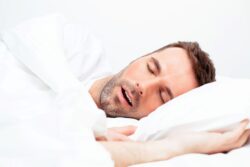Is It Snoring or Sleep Apnea? How to Tell the Difference
April 5, 2024
Snoring and sleep apnea are often mentioned together because they frequently occur in the same people. However, these conditions are not the same. In order to manage your health properly, you should understand the differences between them. This blog post provides some important information that can help you to keep a close eye on the quality of your sleep.
Snoring and Sleep Apnea: What Are They?
Snoring is simply the sound that occurs when air moves past the tissues in your mouth, nose, and throat. This vibration can be a soft, subtle noise, or it can be quite loud. It may occur frequently or only on occasion. Light, infrequent snoring by itself is generally harmless (unless it is disturbing your partner, in which case you may need to take action to address it).
Sleep apnea is a condition characterized by pauses in breathing during sleep. The more common form of sleep apnea, obstructive sleep apnea (OSA), occurs when the same tissues that vibrate during snoring completely block the airway. OSA is dangerous because it can cause constant fatigue and increase your risk of numerous health problems, including heart attacks and stroke. Very often, loud, frequent snoring is a symptom of OSA.
Does Your Snoring Mean that You Have OSA?
Your snoring might mean that you have OSA if:
- You snore loudly and frequently.
- Your partner has observed that you sometimes stop breathing at night.
- You often wake up with a sore throat or headache.
- You frequently feel exhausted despite getting at least 8 hours of sleep.
- You sometimes wake up gasping for air.
Of course, the above-listed symptoms do not guarantee that you have OSA, but they do mean that you should talk to your doctor about arranging a sleep test. It is also worth noting that OSA does not always come with snoring. Any time you suspect you have a sleep disorder, you should talk to a qualified medical provider.
On the other hand, your snoring is probably not a big problem if:
- You snore lightly and infrequently.
- Your snoring only occurs on specific occasions, such as when you drink alcohol too close to bedtime or go to sleep when you are extra tired.
- You usually wake up feeling refreshed.
- Your snoring does not disturb your partner.
Snoring and sleep apnea often go hand in hand, but they are not the same thing! Be sure to monitor the quality of your sleep so you can seek medical care if necessary.
Meet the Practice
Dr. Kenneth Mogell is double-board certified in dental sleep medicine. Throughout his long and accomplished career, he has helped countless individuals to find freedom from both snoring and sleep apnea. If you are concerned about the quality of your sleep, he and our team would be pleased to speak with you and help you determine your next steps. Contact any of our three locations or call our Boca Raton office at 561-353-5252.
